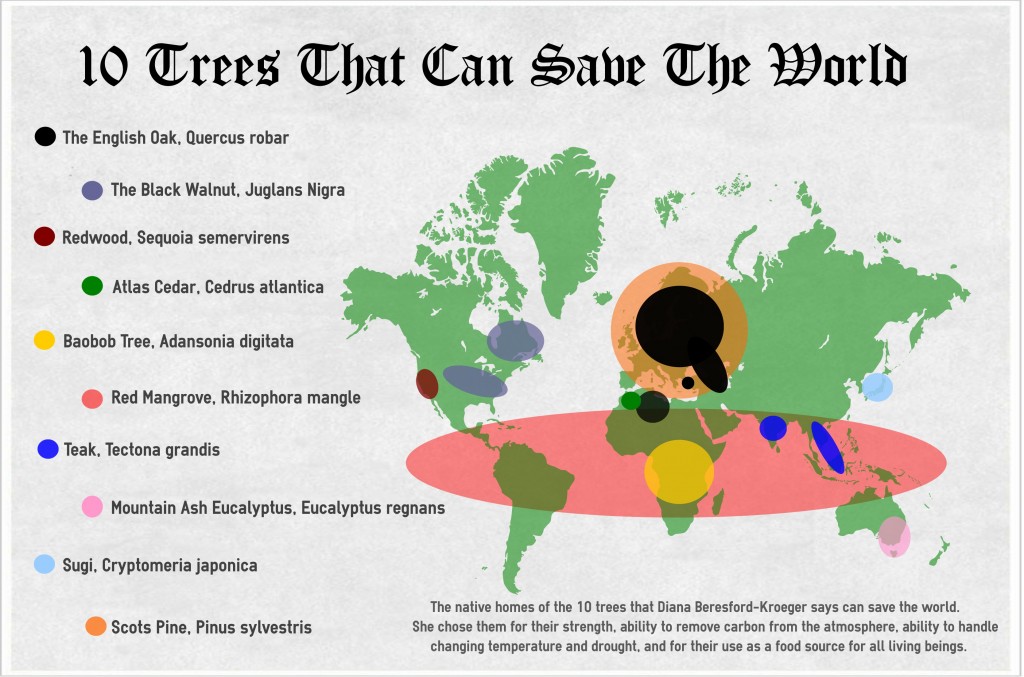Activist’s message: All you need is trees
BELLEVILLE – Diana Beresford-Kroeger is the ultimate tree-hugger.
The scientist and author, who lives on a property near Merrickville, has created a “bioplan” to get ordinary people to see nature in a different way and to work with each other to plant a global forest.
She is the subject of an upcoming documentary with the working title 10 Trees That Can Save the World, and is speaking in Trenton on Friday.

Diana Beresford-Kroeger has named the 10 trees that she says can save the world. Photo by Erika Beresford-Kroeger
Beresford-Kroeger has studied many areas in the sciences, including chemistry, organic chemistry, nuclear chemistry, biochemistry, classic botany and medical surgery. Her goal was to get a wide, bird’s-eye view of what is going on in the world, she says.
“I’m a scientist. I am phenomenally interested in the natural world, all parts of the natural world. And to be interested in, to try to study all parts of the natural world, you have to have a very, very complete holistic vision of what’s going on,” Beresford-Kroeger said this week in an interview with QNet News. “And for that the basis of the natural world is the growth of trees. Trees are considered to be heads of the kingdom of the natural world. They are the kings of the forest, really, and all things flow from that.”
Her interest in trees comes from her childhood in Ireland, when she was taught about the that country’s ancient culture. Her family goes back to the fifth century and was called the teachers of kings, Beresford-Kroeger said. During her childhood a prophecy was put upon her saying she was the last voice of the ancient world and had been given that knowledge to bring to the modern world, she said.
Beresford-Kroeger said it is for spiritual reasons, and because she wants to be a mentor for people, that she carries on her work. She believes that in the next 20 years a lot of scary things will happen because of climate change, she said.
“I have to have the responsibility (of) talking about this so we can all get together and fix it,” she said. “There are theories and areas of science within physics where we can find answers. The answers are out there, but we’ve got to look” for them.
Her No. 1 answer when people can ask what they can do to help: to plant trees.
“We have to plant trees. We have to conserve our energy sources. We have to put in new thinking and new research and development into the thinking of new energy,” she said.
She describes herself as a single person, not an institution, having spent her life independently researching and writing about what she discovers.
“For my research I’ve been given major awards in the States. I’ve been given the same awards as (prominent animal researcher) Jane Goodall, but very few people know that. They know Jane but they don’t know me,” she said with a laugh.
Beresford-Kroeger spent last year travelling all over the world to film 10 Trees That Can Save the World, which is based on her book The Global Forest.
She describes a Western cedar 54 feet in circumference and about 2,500 years old that she saw on the West Coast. “It was huuuge – I mean, you’re exhausted walking around this tree. And it’s only one tree,” she said.
She also travelled to Japan, where she planted a tree in the Great Forest Wall for protection against tsunamis in Fukushima. To plant the tree, she was given white gloves by the head of the state – which within seconds were covered in dirt.
“It’s like getting a Nobel Prize. You stand up there and you have a tree in your hand and you’re planting it and you’re filthy dirty – you’re getting it in, you know it’s going to be there for thousands of years, so you feel you’ve achieved something. And that’s got nothing to do with money. It’s got nothing to do with anything. It’s got to do with people being together doing something that’ll benefit all of us.”
Beresford-Kroeger is going to be in Trenton Friday to speak at the Trenton Woodlot Conference. She mentioned that her favourite tree in this area is the Bur oak, Quercus macrocarpa. This tree provided food, flour and many other things for the aboriginal people in the last 12,000 to 20,000 years, she said.
“The acorns from that tree are edible,” and an aboriginal person looking up into the tree would have seen the acorns as vegetables, she explained. “It was a unique culture around those trees. But we’ve forgotten all of that stuff now.”
Beresford-Kroeger’s views reach thousands of people a year through her speeches, papers and books.
“I feel I have to do this. And it is important, and maybe for me, maybe only one person in the audience will get a spark. Maybe only one person or two people will say, ‘Oh my God – I have to do something about that.’ But that’s where it begins,” she said.
 Print This Post
Print This Post







